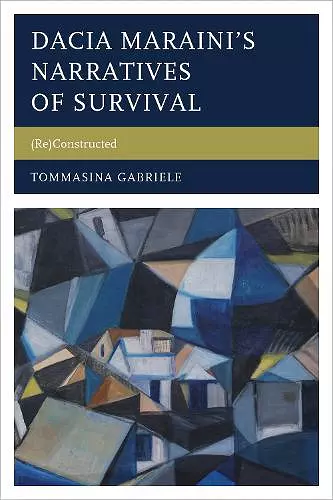Dacia Maraini’s Narratives of Survival
(Re)Constructed
Format:Hardback
Publisher:Fairleigh Dickinson University Press
Published:3rd Dec '15
Currently unavailable, and unfortunately no date known when it will be back

This book examines Dacia Maraini’s works, focusing on themes of survival and reconstruction through a critical lens that transcends traditional feminist readings.
Dacia Maraini’s Narratives of Survival delves into the author's work from 1984 to 2004, utilizing her interviews and essays to explore the themes of survival and reconstruction. While the significance of feminist scholarship surrounding Maraini's narratives is acknowledged, this book aims to transcend traditional feminist interpretations by establishing a broader critical framework that encompasses various genders and genres. Through detailed textual analysis, the author examines the roles of men, children, animals, and fictional characters within Maraini's stories, analyzing language, motifs, and symbols. This approach also considers her works in the context of shifting critical theories, particularly the decline of postmodernism and the rise of posthumanism.
The concept of reconstruction serves as a central theme in Narratives of Survival, highlighting Maraini's profound commitment to survival shaped by her childhood experiences in a WWII Japanese concentration camp. This narrative reconstruction encompasses personal memories, social and political histories, motherhood, crime stories, and the complexities of postmodern fragmentation. Maraini's work addresses various dimensions of survival, from the physical and psychological to the cultural legacy of women writers, and even extends to issues of collective and ecological survival.
Notably, Maraini's narratives are imbued with an ethos of resilience and renewal, steering clear of nihilism and despair. The author emphasizes the importance of 'beginning again,' a recurring motif in Maraini's novels, particularly evident in works such as Il treno per Helsinki, Isolina, and Colomba. This exploration not only enriches the understanding of Maraini's contributions to literature but also invites readers to engage with her narratives on multiple levels.
Gabriele performs an in-depth reading to determine the narrative strategies used to expose the forces and structures that mute voices and erase presences.... Drawing upon feminist and literary theory, and genre and memory studies, Gabriele’s timely monograph examines Maraini’s decades-long critique of the institutional and sociocultural victimization of women, children, and, just as important to the author’s opus and world-view, animals. Within this framework, it provides a compelling analysis of Maraini’s recurrent representation of the interplay between trauma, memory, and the self, issues that are increasingly an integral part of the Italian national discourse on rights. * Modern Language Review *
Tommasina Gabriele’s Dacia Maraini’s Narratives of Survival: (Re)Constructed is a valuable contribution expanding the scholarship on the works of one of the most engaging and prolific contemporary Italian female authors.... Gabriele’s clear and straightforward prose aptly interprets Maraini’s inclination to put the literary text at the service of critical social issues.... The “re-construction” that Gabriele looks at in her book indeed leads towards Maraini’s much coveted awareness by turning the past into a memorial process that fosters acknowledgment of meaning and truth. And this is perhaps the most novel aspect of this book, making it a challenging and timely contribution to the current debate about Maraini’s work among researchers and scholars. But it also makes it an appealing read for teachers and the general public interested in exploring the social, cultural, and political activism underscoring Maraini’s writing. * gender/sexuality/italy *
ISBN: 9781611478815
Dimensions: 238mm x 159mm x 18mm
Weight: 413g
186 pages